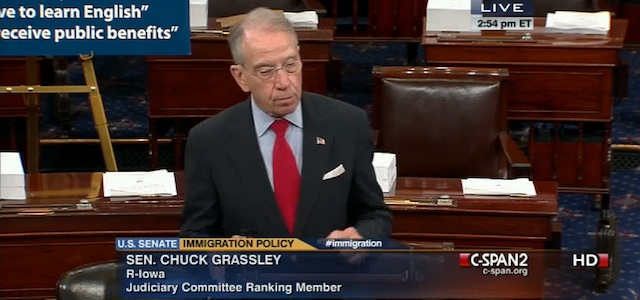 During The first full day of debate after the Senate approved a motion to proceed to S. 744, the Border Security, Economic Opportunity, and Immigration Modernization Act, several Senators sought to make the debate all about border security. In the process, they proposed amendments that tie border security increases to the start of the legalization program in ways that make legalization a virtually unattainable goal. One of these amendments is from Sen. John Cornyn (R-TX). His RESULTS amendment ties the fate of unauthorized immigrants who are already living in the United States, and who have applied for legalization, to the success of highly stringent border-enforcement measures in deterring future unauthorized immigration. However, applicants for legalization have no control over the ability of the federal government to maintain the integrity of U.S. borders, so there is no logical reason to link their legal status to border-enforcement metrics. The RESULTS amendment also mistakenly views immigration reform as a two-step process: enforcement, followed by legalization. However, the various components of immigration reform must be implemented simultaneously to maximize their effectiveness. The amendment breaks apart what should by a single, integrated revamping of U.S. immigration policy. Finally, the RESULTS amendment contains no mechanism for judging the feasibility or cost-effectiveness of the border-security measures and metrics that it would mandate.
During The first full day of debate after the Senate approved a motion to proceed to S. 744, the Border Security, Economic Opportunity, and Immigration Modernization Act, several Senators sought to make the debate all about border security. In the process, they proposed amendments that tie border security increases to the start of the legalization program in ways that make legalization a virtually unattainable goal. One of these amendments is from Sen. John Cornyn (R-TX). His RESULTS amendment ties the fate of unauthorized immigrants who are already living in the United States, and who have applied for legalization, to the success of highly stringent border-enforcement measures in deterring future unauthorized immigration. However, applicants for legalization have no control over the ability of the federal government to maintain the integrity of U.S. borders, so there is no logical reason to link their legal status to border-enforcement metrics. The RESULTS amendment also mistakenly views immigration reform as a two-step process: enforcement, followed by legalization. However, the various components of immigration reform must be implemented simultaneously to maximize their effectiveness. The amendment breaks apart what should by a single, integrated revamping of U.S. immigration policy. Finally, the RESULTS amendment contains no mechanism for judging the feasibility or cost-effectiveness of the border-security measures and metrics that it would mandate.
Senate Majority Leader Harry Reid (D-NV) dismissed the RESULTS amendment as a “poison pill.” But during Wednesday’s debate, Cornyn said his amendment includes most of the same border provisions already in S. 744, though there are substantive differences. Additionally, some senators have said they will only support the bill if the RESULTS amendment is accepted.
Another amendment that would change the border provisions in S. 744 is Sen. Chuck Grassley’s (R-IA) amendment No. 1195. The amendment would delay the processing of the 11 million undocumented immigrants in the U.S. into Registered Provisional Immigrant (RPI) status until the Secretary of Homeland Security has maintained “effective control of the Southern border for at least 6 months.” This changes the bill’s original intention of beginning the RPI registration process immediately.
Grassley 1195 continues the “enforcement first” strategy that has been employed unsuccessfully over the past two decades. The reason for creating a comprehensive bill is the recognition that successful immigration policy requires all of the components of reform to work in tandem, not one after the other, but all together at the same time. Creating a system in which the undocumented living in this U.S. have to wait additional months or years after bill passage to get onto the books and into a legal status, will effectively require the continuation of the status quo. The idea of this bill is not to maintain the status quo, (which is understood by everyone involved to be unacceptable) but to begin the process of securing the border and regularizing the status of 11 million undocumented immigrants at the same time.
We have learned that we can’t fix our immigration system by focusing on the border or enforcement or any one aspect of the immigration system alone. The fact is that immigration enforcement without immigration reform has been failing for decades, so measures like the Cornyn and Grassley amendments to continue the build-up of border security while blocking the path to citizenship for undocumented immigrants will not help. Moving forward on legalization isn’t about abandoning enforcement but about addressing the significant problems that face our immigration system together. We can reap enormous benefits from legalizing the undocumented, both in terms of their economic and social contributions, and in terms of creating a more secure and accountable system, as we will know who is in the U.S. and who can lawfully work here. But we can’t do it if we wait years to begin the process of transitioning undocumented people into legal status. Border security can’t be a prerequisite for something that should have been fixed long ago.
Photo Courtesy of C-Span.
FILED UNDER: enforcement, immigration legislation, Republicans, Restrictionists, S.744, Senate


